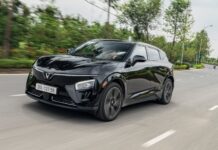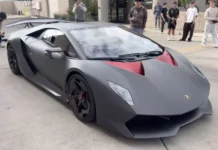
Design – Going against the trend, classic style
Compared to the regular version, the Kawasaki W175 SE has a few differences. Specifically, the changed details are the black fuel tank with black side panels, the seat, front/rear fenders, wheels, and finally the side panels under the seat. In addition to the above changes, the design and engine of the bike remain unchanged.

Kawasaki W175 SE (Special Edition).
As you can see, regardless of the version, the W175 is still a classic-style motorcycle, and this is clearly shown in the details on the bike. At the front, the bike is equipped with retro round headlights and two turn signal lights – all using Halogen bulbs instead of LED lights like the current trend.


On the handlebars, the instrument cluster of the W175 has a very minimalist design, similar to the bikes from decades ago. The rider will face only one speedometer with an odometer and a distance meter driven by mechanical operation. In addition, there are other indicators such as headlights, turn signals, and an N indicator.

Meanwhile, the bike does not have warning lights for gear and fuel. In fact, this issue will be difficult for users in the beginning but will get used to it after a period of use.


The Kawasaki W175 SE is designed with a 13.7-liter fuel tank. In addition, there is also a fuel lock to adjust manually with three positions depending on the usage needs (ON/OFF/RES). According to the manufacturer’s specifications, the W175 will generally have a fuel consumption of 2.3 liters/100 km.
I myself have filled up the tank a few times and have been able to run about 370 – 450 km until the engine shuts down completely (this includes turning the fuel knob to RES, which allows for a few more tens of km). Anyway, the fuel consumption of a bike does not only stop at the manufacturer’s stated level but also depends on each person’s driving style and road conditions.


One thing to note about the Kawasaki W175 SE is the positions of the fuel lock. In the ON position – Under normal driving conditions, the fuel will be directly supplied from the fuel tank to the carburetor but a small reserve in the fuel tank is left to hold a certain amount of fuel for cases of running out of gas on the road because the bike does not have a fuel gauge. Typically, the manufacturer recommends keeping the fuel lock in this position to account for the case when it runs out of gas, there will still be about 1.5 to 2 liters of reserves (depending on the bike) to find the nearest gas station.

The RES position (many bikes have it labeled as STANDBY) – The knob located at this position allows you to use the remaining fuel in the reserve. If you leave the knob in this position when traveling long distances and run out of gas, your bike will definitely have a full tank of gas. Lastly, the OFF position – it is the fuel lock or simply not allowing fuel to flow into the carburetor anymore. You should keep it in this position when the bike is not used for a long period of time for safety reasons.

Engine – Hard to start when cold, “powerful” and smooth
The Kawasaki W175 SE uses a SOHC engine, single-cylinder, 4-stroke, 2-valve, air-cooled, traditional carburetor fuel injection, with a displacement of 177 cc. This engine produces a maximum power of 13 horsepower at 7,500 rpm and a maximum torque of 13.2 Nm at 6,000 rpm, accompanied by a 5-speed gearbox. The engine starts with electricity and no kickstart.
In terms of acceleration capabilities, the Kawasaki W175 SE is truly powerful from the first range of engine speed, the bike reaches maximum torque very quickly at low engine speed. When reaching a speed of 70 km/h or more, the bike starts to lose power and accelerates slowly. The clutch lever of the bike is not too heavy, making it more comfortable to handle in crowded traffic.

The Kawasaki W175 SE is truly powerful from the first range of engine speed, “leaving the line” relatively fast.
The bike provides a very smooth and subtle gear-shifting experience, almost no “clinking” sound when shifting gears. The bike’s exhaust sound is quite “gentle” at low and high speeds. The engine is quite hot and uncomfortable on both sides of the legs, especially the right leg because it is close to the exhaust pipe.


One somewhat inconvenient issue with the W175 SE is the difficulty starting the engine when it is cold. According to my research, the cause is that the company adjusted the fuel a little short to save fuel and control emissions to protect the environment.
Although there is still a kickstart (aka an air scoop or le scooper) on the fuel tank, it is quite inconvenient to have to pull it down every time the engine starts when it is cold because I sometimes forget to push it back up afterward. Besides, it is possible to easily adjust the starting process by rotating and adjusting the air screws and galanti.

Riding experience – Good handling, a bit tiring, and slightly hard seat
The sitting posture of the W175 SE is not very comfortable, it can be difficult for first-time users. Besides, the design of the handlebars is somewhat wide and low, which can make the rider feel tired when riding for a long time, but in return, it will have a large steering angle and a more handsome sitting posture.
The switch system is designed reasonably, fits the position of the wrist, so I don’t find it difficult to use. On the regular version of the W175, the seat is only covered with simple fake leather fabric, while the W175 SE version has padded seats that resemble a loaf of bread. In addition, this version also has more eye-catching decorative stickers.

The seat of the bike is designed with bovine-style sturdy leather with the shape of a loaf of bread to create a nostalgic feeling, although the seat is slightly hard. The rear seat is small in size. Without a rear rack, the passenger will not find a support point if not sitting close to or hugging the rider in front.
Thanks to the relatively high ground clearance, the bike is easy to ride on curbs. However, people with modest height will find it difficult to touch the ground when putting their feet down.

The front/rear suspension system of the W175 SE is still not really “smooth”, but thanks to that, when operating at high speeds, the bike gives a solid, firm riding feel and reduces vibrations from the road affecting the handlebars. In addition, due to the relatively heavy total weight of the bike (when the fuel tank is full), the bike can run longer and more stable.


As mentioned above, the W175 SE has a sweet “idle” so both riding alone and with two people on this bike show very smooth and “smooth” movement. When going over speed bumps in urban areas or rough road sections at high speeds, the force acting from the road back to the rider is very minimal.

One notable point is that the rear shock absorber of the bike is a bit hard. Many people who already own and use the W175 think that the rear shock absorber may be faulty. Myself when I first rode it, I also thought so and considered changing a pair of rear shock absorbers from another brand many times.
Fortunately, I researched again and sought advice from the technical experts of the company. The issue here is that the pair of rear shock absorbers has many adjustable levels, and the company finds it difficult to adjust it to the customer’s satisfaction. The “stock” level of the rear shock absorbers is at level 4 (while there are a total of 5 levels), if you want it to be more cushioning, just pull both sides back to level 2. Depending on the driving needs of each person, alone or with two people, rotate the shock absorber levels to suit.
Conclusion
In general, the Kawasaki W175 SE is a bike that consumers can feel completely confident to spend nearly 70 million VND to own. In the 177 cc segment, the Kawasaki W175 SE is completely unique, unlike other bikes in the same price range.

With the launch of the W175, Kawasaki has somewhat satisfied the thirst for “pure” classic-style bikes. If you don’t mind spending extra time and money to get an A2 license, owning a W175 is definitely worth it.
>>> SEE MORE PHOTOS OF KAWASAKI W175 SPECIAL EDITION <<<
Le Huy (forum.autodaily.vn)





































